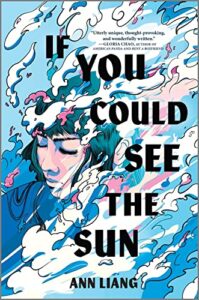 If You Could See The Sun, by Ann Liang, uses a supernatural invisibility power to tell a moving, realistic story about class, money, and adolescence in Beijing.
If You Could See The Sun, by Ann Liang, uses a supernatural invisibility power to tell a moving, realistic story about class, money, and adolescence in Beijing.
When teenage “Study Machine” Alice Sun discovers her invisibility power, she immediately puts it to use to earn money to pay her exorbitant school fees. She’ll do favors and perform secret tasks that only someone invisible could accomplish, anonymously, of course. Once Alice started getting secrets and requests of secret favors, I thought this was going to turn Gossip Girl, but there’s a uniquely Beijing flavor. No mean girls or gossipy backstabbing here, as much as ambitious high-school students willing to do anything for success.
To get her invisible-favors side hustle going, Alice has to turn to her (handsome) academic rival, Henry Li. Henry agrees to build the app and split the profits, which starts out as BULLSHIT because ALICE is the one doing all the DANGEROUS work! Also Henry doesn’t even need the money! But as their app, Beijing Ghost, takes off, Henry somehow starts doing more decoy work to let Alice work her invisibility magic. Henry creates increasingly goofy and risky distractions as the story goes on, adding humor and also making it clear that he doesn’t think they’re rancorous enemies. I thought the book’s title should have been Beijing Ghost. I mean, the story’s about the invisible parts of Beijing: the unofficial rules and class divisions and struggles, Alice’s own secrets and then her classmate’s secrets. I also loved that her plan was an app — you can order anything from Taobao in Beijing, so why not a secret favors app? This is so Beijing and so now, and just a wonderful, obvious next step for Alice’s situation.
I taught in a Beijing high school, although it wasn’t nearly as high-class and prestigious as Alice’s school, so a lot of the school life felt familiar. The extreme exam pressure and the glorification of exhaustion made such a good background for the supernatural storyline, and Alice’s own story. I loved that this book talks about fuerdai students avoiding the gaokao in an IB school, without feeling the need to explain fuerdai or gaokao in detail. It made me feel like If You Could See The Sun was for me.
I want to highlight a scene that stuck with me: Without spoilers, there’s a recounting of a crime in the only Asian-owned business in a town, and the responding police officers say it’s probably not race-related, just random. And there’s no way to prove it was a hate crime. I filled up with rage, like this was every guy who’d ever said, sure, that particular woman earns less than her coworker, but are you SURE it’s gender-related? I mean, did the boss specifically say he won’t pay women decent money? Can you prove it? Same thing here… a criminal targeted the Asian-owned store and harmed the owners, but did he specifically say he’s racist? Ugh. This part is infuriating, but also highlights this whole invisible-rules theme in the book.
I’ve read other novels about ambitious social climbing, like Everybody Rise, Snobs, or Social Creature, or just books about characters who aspire to more than they have. Alice is sort of in this mode, with her intense (but still likable) ambitions. The twist really is her invisibility powers — this isn’t a manners novel of a working-class girl carefully imitating the style, speech, and correct designer handbags of the upper classes. Instead, Alice’s superpower comes from being unseen and unnoticed.
Being the Beijing Ghost while getting top grades is exhausting, but Alice can’t give up either one. Eventually, Alice has to decide how much she’s willing to do to stay in Airington High School and achieve her goals. This section was an absolute pageturner, because I wanted Alice to be able to stay in her school and follow her ambitious and I didn’t want her to do the increasingly sketchy (and increasingly well-paid) ghost missions at the same time. This question of what are you willing to do? where do you draw the line? who are you becoming is such a solid YA center, with a great character and so much Beijing style here.
Don’t let the generic cover fool you. This is not a generic YA.
